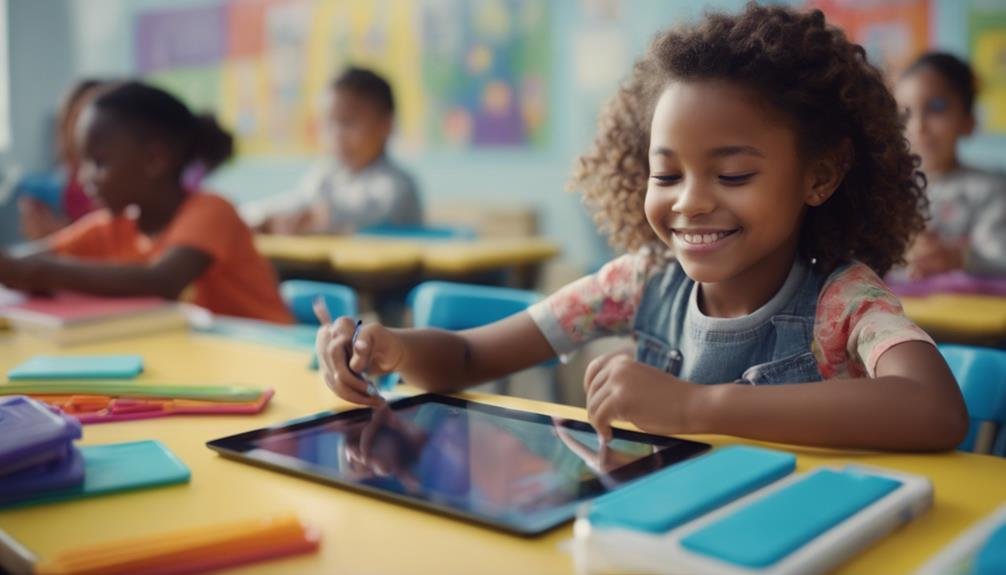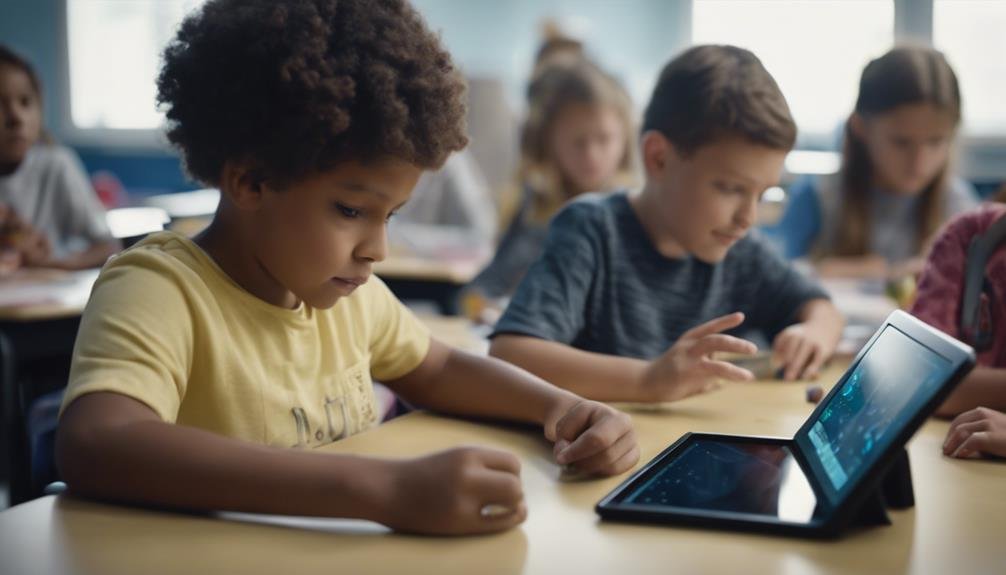"Cherishing Little Steps - A Haven for Baby and Family Journeys"
The Role of Technology in Early Childhood Education
In the domain of early childhood education, the debate over the role of technology persists. While some advocate for traditional methods, others champion the integration of technological tools for young learners.
As a parent or educator, you may wonder how technology can truly benefit children in their formative years. Are digital devices mere distractions or valuable aids in fostering important skills and knowledge acquisition?
The evolving landscape of early childhood tech prompts reflection on its implications for the youngest members of our society.
Key Takeaways
- Technology enhances cognitive development and learning outcomes in early childhood.
- It fosters interactive and engaging educational environments for young learners.
- Tailored learning activities promote critical thinking and problem-solving skills.
- Technology prepares children for future academic challenges and digital literacy advancements.
Benefits of Technology in Early Childhood

Embracing technology in early childhood education greatly enhances learning outcomes and cognitive development, fostering a dynamic and engaging educational environment for young learners. Interactive experiences play a vital role in this process, offering hands-on learning opportunities that cater to the natural curiosity and exploratory nature of children. By incorporating technology into the early childhood curriculum, educators can provide stimulating activities that not only captivate young minds but also promote active participation and critical thinking skills.
Through interactive experiences, children can explore virtual worlds, manipulate digital tools, and engage in immersive learning adventures that spark their creativity and problem-solving abilities. These hands-on learning opportunities not only make education more enjoyable but also help children develop essential skills such as collaboration, communication, and adaptability. Technology serves as a catalyst for exploration and discovery, opening new pathways for young learners to acquire knowledge and make meaningful connections between concepts.
Digital Learning Tools for Young Children
To introduce young children to the world of technology, educators are increasingly turning to digital learning tools designed specifically for their developmental needs and abilities. These tools offer interactive games that engage young learners while promoting cognitive development and problem-solving skills. Virtual classrooms provide a dynamic environment where children can explore, learn, and interact with educational content in a fun and engaging way.
- Interactive Games: Stimulate children's curiosity and creativity through interactive challenges.
- Virtual Classrooms: Create immersive learning experiences that mimic real-life educational settings.
- Adaptive Learning Platforms: Tailor learning activities to each child's individual needs and pace of learning.
- Multisensory Experiences: Engage children through a variety of senses, enhancing retention and understanding.
Engaging Educational Apps for Kids

Engage young learners in interactive and educational experiences through a curated selection of innovative apps designed to enhance their cognitive development and learning skills. Interactive learning has taken a significant leap with the advent of educational apps tailored for kids. These apps offer a dynamic way for children to explore various subjects, from math and science to language and creativity, in a fun and engaging manner. By striking a balance between screen time and hands-on activities, these apps can complement traditional learning methods and stimulate young minds effectively.
With interactive learning apps, children can explore a world of knowledge right at their fingertips. These apps not only enhance academic skills but also foster critical thinking, problem-solving abilities, and creativity. By incorporating elements of gamification, children are motivated to learn and explore in a way that feels more like play than study.
Parents and educators play an essential role in guiding children to use these apps wisely, ensuring that screen time is balanced with physical activities and social interactions to promote holistic development. By leveraging the power of technology in a mindful manner, educational apps can be powerful tools in shaping young minds for a brighter future.
Impact on Cognitive Development
Interactive educational apps have shown a significant impact on children's cognitive development, enhancing their critical thinking skills and fostering creativity through engaging digital experiences. When children interact with educational apps, their brains are stimulated, aiding in brain development and improving their overall cognitive abilities. This positive influence on brain development can lead to enhanced problem-solving skills and better memory retention. Additionally, by utilizing educational apps, children can develop essential digital literacy skills, preparing them for an increasingly tech-driven world.
- Enhanced Brain Development: Interactive apps stimulate the brain, supporting cognitive growth.
- Improved Problem-Solving Skills: Children develop critical thinking abilities through engaging with educational content.
- Digital Literacy Advancement: Exposure to educational apps fosters proficiency in exploring digital platforms.
- Extended Attention Span: Engaging digital experiences can help increase children's attention span and focus during learning activities.
Through the integration of educational apps, children not only expand their knowledge but also sharpen their cognitive skills, preparing them for future academic challenges while managing screen time effectively.
Enhancing Social Skills Through Technology

By integrating technology into early childhood education, you can help children develop essential social skills through interactive digital experiences. Virtual playdates and interactive learning applications provide opportunities for children to engage with their peers in a fun and educational way. These platforms allow children to practice important social skills such as turn-taking, collaboration, and problem-solving while interacting in a virtual environment.
| Technology Benefits for Social Skills | Description | Example |
|---|---|---|
| Virtual Playdates | Virtual playdates offer children the chance to interact with friends online, fostering communication skills and social interactions. | Video calls with friends to play interactive games together. |
| Interactive Learning | Interactive learning apps encourage children to work together, share ideas, and learn from one another, promoting teamwork and collaboration. | Collaborative storytelling apps where children create stories together. |
| Social Media Integration | Social media tools in educational platforms can help children develop digital communication skills and understand online etiquette. | Using a kid-friendly social media platform to share their artwork and interact with classmates. |
Through social media integration and interactive activities, technology can play a significant role in enhancing children's social skills, preparing them for future social interactions and relationships.
Emotional Development and Tech Integration
Exploring the intersection of emotional development and technology in early childhood education reveals a dynamic landscape of opportunities for nurturing children's social-emotional skills. When it comes to enhancing emotional intelligence in young learners, technology can play a significant role. Here are some key points to ponder:
- Technology and Empathy: Interactive apps and games can help children understand and express their emotions, fostering empathy towards others.
- Screen Time Balance: Striking a balance between screen time and other activities is vital for healthy emotional development. Encouraging offline interactions is essential.
- Virtual Reality for Emotional Learning: Utilizing virtual reality experiences can create safe spaces for children to explore and manage their emotions effectively.
- Parental Involvement: Involving parents in technology-assisted emotional development programs can strengthen the support system around the child, enhancing the learning experience.
Overcoming Challenges in Implementation

To effectively integrate technology for emotional development in early childhood education, addressing and overcoming implementation challenges is imperative for maximizing the benefits of tech-assisted learning experiences. When it comes to implementation strategies, it's essential to involve parents in the process. Encouraging parental involvement can help bridge the gap between technology use at school and at home, creating a more cohesive learning environment for the child.
One effective strategy is to provide parents with training sessions or workshops on how to navigate the educational technology used in their child's learning. This not only empowers parents to support their child's learning journey but also fosters a sense of collaboration between home and school.
Additionally, creating open channels of communication between educators and parents can guarantee that everyone is on the same page regarding the goals and expectations of integrating technology for emotional development. By working together, both parents and educators can overcome implementation challenges and create a supportive ecosystem where children can thrive emotionally and academically.
Future Trends in Early Childhood Tech
In the domain of early childhood education, a wave of innovative technological advancements is shaping the future landscape of learning experiences for young learners. Embracing these trends can pave the way for a more engaging and effective educational journey for children.
Here are some exciting future trends in early childhood tech for you to explore:
- Tech literacy: As technology becomes increasingly integrated into our daily lives, fostering tech literacy from a young age is important to prepare children for the digital world ahead.
- Interactive learning: Interactive platforms and tools are revolutionizing the way children engage with educational content, making learning more dynamic and immersive.
- Personalized learning experiences: With adaptive technology, children can receive tailored learning experiences based on their individual strengths and weaknesses, promoting a more effective educational process.
- Augmented reality (AR) and virtual reality (VR): These immersive technologies have the potential to transport children to new worlds, enhancing their creativity and understanding of complex concepts in a fun and interactive manner.
Frequently Asked Questions
How Can Parents Ensure That Their Children Are Using Technology in a Balanced and Healthy Way Outside of the Classroom?
To guarantee your child's healthy tech habits, engage in parental supervision. Set digital boundaries together, fostering family engagement. By actively participating in their tech use, you can guide them towards balanced and beneficial screen time.
What Are Some Potential Risks or Drawbacks of Integrating Technology Into Early Childhood Education?
As you explore integrating technology in early childhood education, be mindful of ethical implications on social interaction. Consider potential risks affecting cognitive development like attention span. Embrace balance for a holistic learning experience.
How Can Educators Effectively Assess the Impact of Technology on Young Children's Learning Outcomes?
To effectively assess technology's impact on young children's learning outcomes, you must observe their engagement levels, cognitive development, and skill acquisition. Conduct regular assessments, analyze data, and adapt teaching methods accordingly to optimize educational outcomes.
Are There Specific Guidelines or Recommendations for the Amount of Screen Time Young Children Should Have Each Day?
You should aim for a balance in screen time for young children. Guidelines suggest limited exposure and active parental involvement. Encourage outdoor play and physical activities to promote holistic development and reduce sedentary behaviors.
What Are Some Strategies for Addressing Concerns About Data Privacy and Security When Using Technology in Early Childhood Education?
To address concerns about data privacy and security in early childhood education, guarantee parental involvement in setting privacy settings. Emphasize online safety through data encryption. By prioritizing these measures, you create a safer digital environment for young learners.
Conclusion
You've seen how technology is shaping the landscape of early childhood education, with benefits like improved cognitive development and social skills.
Did you know that 85% of preschool teachers believe that technology helps children learn better?
As we look towards the future, the integration of technology in early education will continue to evolve, offering new opportunities for young learners to thrive in a digital age.
Embrace the power of technology to make a positive impact in early childhood education!



You actually make it seem really easy together with your presentation but I
find this matter to be really something which I think I’d never understand.
It seems too complicated and extremely extensive for me. I am having a look
ahead to your next submit, I’ll try to get
the hang of it! Escape roomy lista
I like this website it’s a master piece! Glad I discovered this on google.!
Nice post. I learn something new and challenging on websites I stumbleupon everyday. It’s always useful to read through content from other authors and use a little something from their sites.
Great article. I’m facing some of these issues as well..
Greetings! Very useful advice within this post! It is the little changes that make the greatest changes. Thanks a lot for sharing!
I’m very happy to find this web site. I want to to thank you for ones time just for this wonderful read!! I definitely loved every little bit of it and I have you book-marked to look at new things on your website.
I was able to find good information from your articles.
Everything is very open with a very clear clarification of the challenges. It was really informative. Your site is extremely helpful. Many thanks for sharing.
Saved as a favorite, I really like your web site.
I love it when folks get together and share opinions. Great blog, keep it up.
I like it when folks get together and share thoughts. Great website, keep it up.
Very good information. Lucky me I discovered your blog by accident (stumbleupon). I’ve book marked it for later.
Spot on with this write-up, I actually believe this site needs much more attention. I’ll probably be returning to see more, thanks for the advice!
An impressive share! I’ve just forwarded this onto a colleague who had been conducting a little research on this. And he actually ordered me lunch due to the fact that I found it for him… lol. So let me reword this…. Thanks for the meal!! But yeah, thanks for spending the time to discuss this topic here on your website.
Good site you have here.. It’s hard to find high quality writing like yours nowadays. I honestly appreciate people like you! Take care!!
This site was… how do you say it? Relevant!! Finally I’ve found something that helped me. Thank you.
I could not refrain from commenting. Well written!